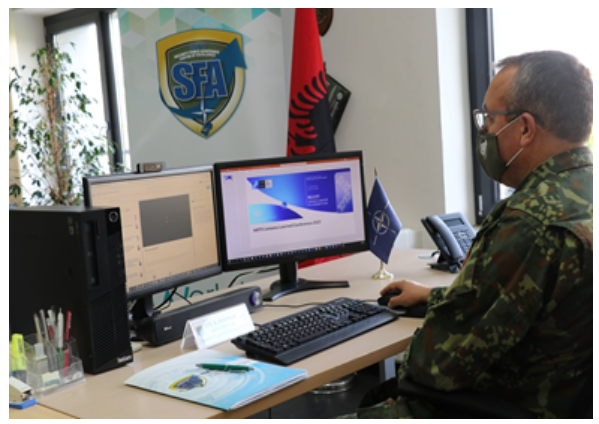
NATO SFA COE participated in the online NATO Lessons Learned Conference 2021 (NLLC21)
According to
the annual Bi-Strategic Command (BiSC) Programme of Work, the Headquarters
Supreme Allied Commander Transformation (HQ SACT) and the Joint Analysis and
Lessons Learned Centre (JALLC) organized the virtual NATO Lessons Learned
Conference 2021 (NLLC21) from 16 to 18 March 2021. The theme of the Conference
was: “NATO Lessons Learned in a global crisis: what did we learn and how can we
do better?”. The aim of this conference was to discuss challenges and
opportunities identified during the COVID-19 pandemic and to highlight findings
as well as ways and means to potentially improve the Alliance's LL Capability
(how to better "adapt," "deliver," and
"innovate").
During his
welcome speech, the JALLC’s Commander, Brig. General B. Cernat, expressed his
pride that, despite the pandemic and the need for social distancing, the number
and diversity of attendees to the NATO Lessons Learned Conference confirmed
that NATO feels more united than ever.
In his
opening remarks, the Supreme Allied Commander Transformation, General André
Lanata, reminded the audience that the COVID-19 pandemic has been one of the
main drivers of adaptation in 2020 for NATO and that, while it imposed many
constraints, it also pushed the Alliance to quickly adapt to new circumstances.
During this
three-day event, different speakers from different organizations presented and
led discussions on a wide range of critical issues.
The NATO Science and
Technology Organization illustrated the report entitled “The Military Impacts
of COVID-19 on the Alliance: Challenges and Opportunities”, which analyses the
possible post-COVID-19 environment and the potential impact on military operations-This
was useful for NATO’s planners and decision makers. Another Panel discussed how
different Nations resolved similar problems, highlighting that there is a lot
to learn from each other’s experiences, both good and bad.
On the second day, the panels
focused on Partner’s Perspectives on Lessons Learned Capability adaptation and
how NATO successfully adapted Lessons Learned output to meet the needs of the
Alliance and Nations during the COVID-19 pandemic. These panels included presentations
from: the Swedish Armed Forces; the EU Military Staff (EUMS); the Naval
Striking and Support Forces NATO (STRIKFORNATO); the Future Plans and
Requirements Branch at SHAPE and the Lessons Learned Management Division at the
JALLC. They covered topics including how national armed forces provided support
to increase medical facilities and to improve military-civilian cooperation,
and they highlighted a shift in the Lessons Learned culture from a blame
culture to a "just culture".
During the last day, the
Conference dove into the four Break-Out Sessions which covered: Standardization
in Lessons Learned; Improvement and Innovation in Lessons Learned; Collection
and Exploitation of Lessons Learned in Exercises, and Future Leaders’
Perspectives. The sessions allowed the audience to take on a more active role
as they engaged with the facilitators maximizing the ideas-sharing within the
Conference Community.
JALLC’s
Commander’s closing remarks offered some insightful points on the past three
days, affirming that, although NATO responded effectively to the COVID-19
pandemic, the Alliance could do better next time if we learn the lessons now. Furthermore,
he highlighted the need to shape NATO’s organizational culture to make Lessons
Learned a reality at all levels and move towards a new mind-set where accepting
failure is a part of the learning and innovation process.
This event
provides the LL Community with opportunities to share and discuss challenges
and shortfalls as well as best and suitable practices for improving the current
NATO LL Capability and supporting its future development, as such enabling the
continuous transformation of the Alliance.
The NATO SFA
COE is fully involved in the NATO Covid-19 LL campaign and human capital
enhancement and the Centre is working on different projects to fill gaps
identified in the specific SFA domain which has also been affected by pandemic
consequences.
SFA COE LL Branch Head, LTC
Haxhija, actively participated throughout the online sessions. The NATO SFA COE
LL Branch is continuously collecting observations and LL from NATO/EU missions
by participating in SFA contingent/mission commander debriefing meetings and
virtual interviews. In addition, it is promoting relevant activities for the
future and developing new projects for the benefit of the SFA Community of
Interest, including through support to JALLC joint analysis projects by
providing SMEs.







